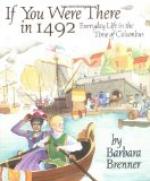Search for Amazonians.
On the 16th of January, Columbus left the Gulf of Samana on his homeward course, from which, however, he deviated at first in the hope of finding the island, peopled with Amazons, described by Marco Polo, of which he had understood the natives of St. Domingo to give him intelligence. Such a discovery would be, he considered, a conclusive proof of the identity of his new country with Marco Polo’s Indies, and when four natives offered to act as his guides, he thought it worth while to steer (in the direction of Martinique) in quest of the fabulous Amazonians. But the breeze blew towards Spain; home-sickness took possession of the crews; murmurs arose at the prolongation of the voyage among the currents and reefs of those strange seas; and, in deference to the universal wish of his companions, Columbus soon abandoned all idea of further discovery, and resumed his course for Europe.
Storm encountered.
At first the voyage was tranquil enough, though the adverse trade-winds, and the bad sailing of the Pinta,[13] retarded the progress of both vessels.
[Footnote 13: This was occasioned by the defective condition of her mast, whereupon the admiral remarks in his diary, that “if Pinzon had exerted himself as much to provide himself with a new mast in the Indies, where there are so many fine trees, as he had in running away from him in the hope of loading his vessel with gold, they would not have laboured under that inconvenience.”]
But on the 12th of February a storm overtook them, and became more and more furious, until, on the 14th, it rose to a hurricane, before which Pinzon’s vessel could only drift helplessly, while the Nina was able to set a close-reefed foresail, which kept her from being buried in the trough of the sea. In the evening both caravels were scudding under bare poles, and when darkness fell, and the signal light of the “Pinta” gleamed farther and farther off, through the blinding spray, until at last it could be seen no more, when his panic-stricken crew gave themselves up to despair, as the winds howled louder and louder, and the seas burst over his frail vessel—then, indeed, without a single skilled navigator to advise or to aid him, Columbus must have felt himself alone with the tempest and the night. But his brave heart bore him up, and his wonderful capacity for devising expedients on sudden emergencies did not forsake him. As the stores were consumed, the Nina felt the want of the ballast which Columbus had intended to take on board at the Amazonian Island. “Fill the empty casks with water,” he said, “and let them serve as ballast,” an expedient which has grown common enough now, but which then was probably original.
The promised PILGRAMAGE




